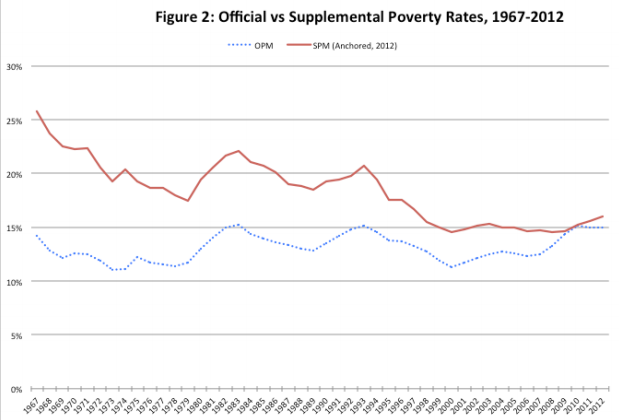Last week AEI hosted an event on the Republican Study Committee’s “Empowerment Initiative” report on “strengthening the safety net.” The event featured a panel of community-level stakeholders, three of the report’s congressional co-signers (Representatives Reed, Barr and Walker), and two poverty policy experts, (AEI’s own Angela Rachidi and Harry Holzer of Georgetown University).
I came in expecting a fairly boilerplate AEI poverty event, with the usual allusions to the dignity of work and importance of making the poor self-sufficient (“If you teach a man to fish…”). And for the most part that is what it was, until it was Harry Holzer’s turn at the mic.
“As some of you may know, polite isn’t always my strong suit.”
Harry Holzer is a legend in U.S. poverty and labor market research, a Professor of Public Policy at Georgetown, and former Chief Economist for the U.S. Department of Labor. He’s also not known for holding back his opinion, and in this case, AEI provided him a captive audience of Republican congressmen.
The link below should begin with Holzer’s remarks at the at 52-minute mark. Off the top, he warns the audience that he’s not known for being polite, but in order to be honest with himself, “a blunt report requires a blunt response.”
What happens next is something one rarely sees in Washington, D.C. Over an uninterrupted twelve minute monologue, Holzer proceeds to pick apart, line by line, what he calls the report’s “demonstrable falsehoods,” multiple “half-truths,” and “overly ideological” and “polemical” rhetoric—inches from the congressmen who had just endorsed it. Watch the whole thing.
For example, Holzer argued that the report’s statement that “the War on Poverty has failed” is demonstrably false by pointing to the Supplemental Poverty Measure. The SPM is a measure of the poverty rate that includes the impact of transfers, and is considered more accurate than the Official Poverty Measure for portraying relative poverty levels. While the OPM shows working age poverty rates are unchanged, research by Wimer et al., using an anchored SPM indicates poverty rates have decreased 40% since 1967 thanks to the very transfer programs the RSC’s paper decried.

Holzer’s bigger point? By not so much as acknowledging this and other well known facts (like the latest research on effective marginal tax rates or the problem of deep poverty) the report undermines its pretension as a genuine rapprochement to the poverty policy community, rather than the familiar ideological signaling.
Missed Expectations
Ever since the release of their report on Poverty, Opportunity, and Upward Mobility, House Republicans have been taking a beating from the left and the right for the sin of repackaging old ideas. The report was widely hyped as Republicans finally getting serious about poverty issues, and was suppose to propose bold and innovative reforms. Instead it mostly copied the thinking from the 1996 welfare reform and pasted it onto SNAP, Medicaid, and Housing by proposing such programs be time limited or block-granted with additional new work requirements thrown in.
This disappointed the left for obvious reasons. More surprising was how ambivalently it was received by those I’ve spoken with on the right. Over the years, smart people on the right have developed many genuinely innovative policy ideas for tackling poverty. These have included reducing structural barriers to opportunity by reforming occupational licensing, or converting EITC into a true wage subsidy.
Of course, one wouldn’t expect either the task force or RSC to converge on these specific policy ideas. But Paul Ryan’s past support for bold and wonkish reforms to the EITC, for example, and the fact that the Task Force’s report was purely aspirational and didn’t bind Republicans to any legislation, set an expectation for something with a little more, well, creativity.
The RSC’s Empowerment report turns out to be an extremely similar document. But when I raised the question of why they are simply repackaging old ideas, an RSC staffer told me they were just citing “what works.”
That’s what makes Holzer’s remarks so devastating. He has strong credentials as a political moderate with a history of working with conservatives. So when he calls something in the report “demonstrably false,” it is only because it flies in the face of, in his words, “the rigorous research evidence.”
That’s a problem. If House Republicans truly want to get serious about tackling poverty they first have to get better a grasp of the facts. Only then will they earn the credibility for poverty experts like Holzer to take their positive vision of reform seriously.